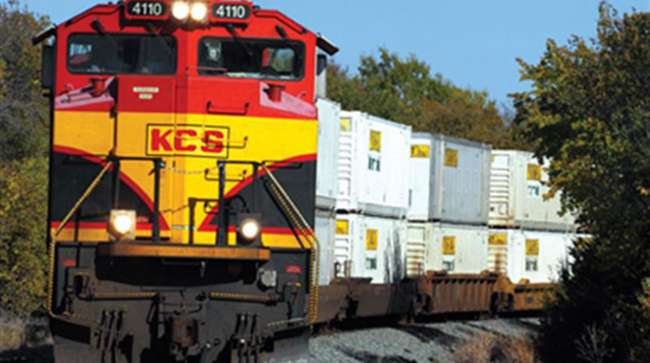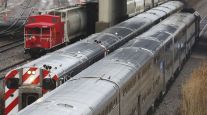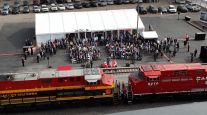Senior Reporter
KC Southern Reports Mixed Earnings Amid COVID-19, Gulf Hurricanes

[Stay on top of transportation news: Get TTNews in your inbox.]
The leadership of Kansas City Southern Railroad said on Oct. 16 the Class I railroad saw a 5.3% increase in third-quarter net income to $189.7 million, or $2.01 a diluted share, compared with $180.1 million, or $1.81, in the same period a year ago.
However, revenue fell 11.7% to $659.6 million compared with $747.7 million a year ago, primarily resulting from lower volumes driven by a decline in demand due to COVID-19 and lower commodity prices, lower fuel surcharge and unfavorable foreign currency impacts.
Officials said consequently overall carloads were down 4% compared with last year.

Ottensmeyer
“Our service was tested this quarter with an unprecedented volume recovery and two hurricanes that struck the heart of our network,” said president and CEO Patrick Ottensmeyer.
“KCS responded by steadfastly executing the lessons learned in its Precision Scheduled Railroading implementation, which included aligning resources with rapidly increasing demand while maintaining a keen focus on preserving efficiencies created from PSR principles,” he said.
The results beat Wall Street analysts’ estimates. A survey of six analysts by Zacks Investment Research put the railroad’s earnings at $1.88 per share. But revenue was estimated at $662.4 million.
The railroad’s third-quarter operating ratio was 58.8%, an improvement from 62.3% in the same period a year ago.
Operating ratio, or operating expenses as a percentage of revenue, is a key industry metric used to measure efficiency. The lower the ratio, the greater the company’s ability to generate profit.
During the quarter the railroad ran with 9% fewer employees.
Kansas City Southern is one of several Class I railroads that has aggressively moved to become more efficient with PSR.
Kansas City Southern said its operating expenses were $388.1 million in the third quarter, compared with $465.7 million a year ago.
The railroad said the reduction in employees resulted in a 12.9% year-over-year savings as it spent $117.4 million on compensation and benefits in the third quarter of 2020, compared with $134.8 million last year.

Over the past few episodes, we've had the chance to listen to the experiences of industry leaders and the strategies and planning that go into finding the right people for your workforce. Host Michael Freeze reviews the most important bullet points, from technician and driver training to incorporating diversity in recruitment and retention. Hear a snippet, above, and get the full program by going to RoadSigns.TTNews.com.
Fuel charges also declined 41.6% compared with 2019. The company spent $50.8 million on diesel fuel this year, compared with $87.1 million last year.
The record number of hurricanes and tropical storms in the Gulf of Mexico had an impact on the railroad because KCS is the only Class I running a dedicated freight route through an agreement with the Mexican government. The majority of the rail system spans from the Valley of Mexico to the U.S. border at Laredo, Texas. There also are tracks connecting to the port cities of Lázaro Cárdenas and Veracruz.
The company said it saw declines in revenue in each of its major areas that it moves freight.
Revenue from the shipment of chemicals and petroleum fell 1% to $191.9 million from $194.2 million last year.
Industrial and consumer products saw a 19% year-over-year decline to $126.4 million from $155.9 million in 2019.
Agriculture and minerals dropped by 6% to $125.3 million from $133.7 million last year.
Energy, which includes the transportation of coal and sand for oil hydraulic fracturing, or fracking, and crude oil declined by 28% year-over-year.
Revenue from intermodal dropped 11% to $89.1 million from $100.5 million in 2019.
Revenue from automotive shipments fell 25% to $48.5 million from $64.8 million in 2019.
Want more news? Listen to today's daily briefing:
Subscribe: Apple Podcasts | Spotify | Amazon Alexa | Google Assistant | More



